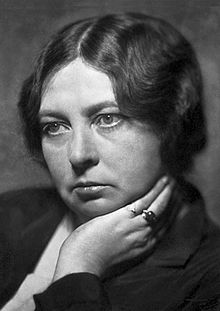Sigrid Undset
| Sigrid Undset | |
|---|---|
 |
|
| Born |
20 May 1882 Kalundborg, Denmark |
| Died | 10 June 1949 (aged 67) Lillehammer, Norway |
| Occupation | Writer |
| Nationality | Norwegian |
| Notable awards |
Nobel Prize in Literature 1928 |
| Relatives |
|
Sigrid Undset (20 May 1882 – 10 June 1949) was a Norwegian novelist who was awarded the Nobel Prize for Literature in 1928.
Undset was born in Kalundborg, Denmark, but her family moved to Norway when she was two years old. In 1924, she converted to Catholicism. She fled Norway for the United States in 1940 because of her opposition to Nazi Germany and the German invasion and occupation of Norway, but returned after World War II ended in 1945.
Her best-known work is Kristin Lavransdatter, a trilogy about life in Scandinavia in the Middle Ages, portrayed through the experiences of a woman from birth until death. Its three volumes were published between 1920 and 1922.
Sigrid Undset was born on 20 May 1882 in the small town of Kalundborg, Denmark, at the childhood home of her mother, Charlotte Undset (1855–1939, née Anna Maria Charlotte Gyth). Undset was the eldest of three daughters. She and her family moved to Norway when she was two.
She grew up in the Norwegian capital, Oslo (or Kristiania, as it was known until 1925). When she was only 11 years old, her father, the Norwegian archaeologist Ingvald Martin Undset (1853–1893), died at the age of 40 after a long illness.
The family's economic situation meant that Undset had to give up hope of a university education and after a one-year secretarial course she obtained work at the age of 16 as a secretary with an engineering company in Kristiania, a post she was to hold for 10 years.
She joined the Norwegian Authors' Union in 1907 and from 1933 through 1935 headed its Literary Council, eventually serving as the union's chairman from 1936 until 1940.
...
Wikipedia
